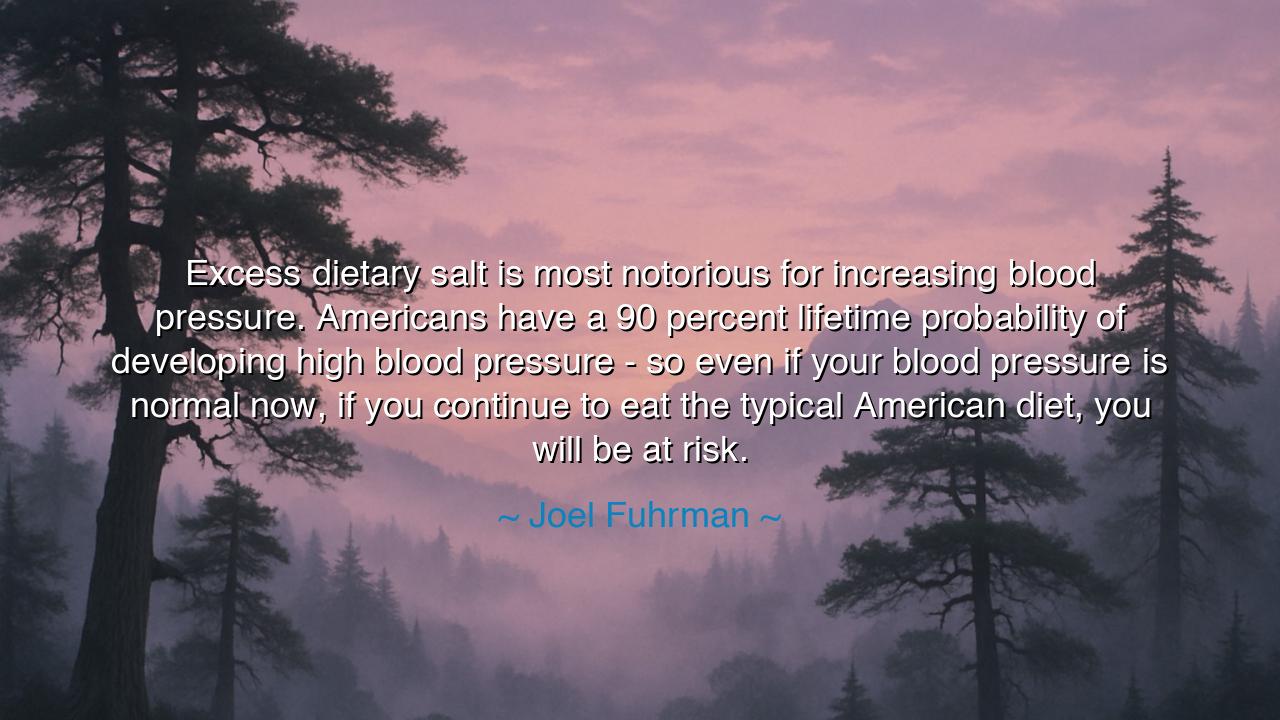
Excess dietary salt is most notorious for increasing blood
Excess dietary salt is most notorious for increasing blood pressure. Americans have a 90 percent lifetime probability of developing high blood pressure - so even if your blood pressure is normal now, if you continue to eat the typical American diet, you will be at risk.






Hear, O children of wisdom, the words of Joel Fuhrman, who speaks with clarity and urgency about the dangers of excess dietary salt: "Excess dietary salt is most notorious for increasing blood pressure. Americans have a 90 percent lifetime probability of developing high blood pressure - so even if your blood pressure is normal now, if you continue to eat the typical American diet, you will be at risk." These words, though spoken in modern times, carry the weight of an ancient truth: the choices we make today in how we nourish our bodies will echo into the future, shaping not just the present moment but the legacy we leave behind.
In the days of old, the great healers and philosophers understood that the body is a vessel, a sacred temple that requires careful tending. The Greek physician Hippocrates—the father of medicine—taught that the food we consume is not merely fuel for the body, but medicine that can either heal or harm. The wise men of ancient times knew that health could not be achieved through indulgence or excess, but through moderation, balance, and the mindful application of nature’s wisdom. And so it is with salt—while it has its place in the body, too much can lead to imbalance, just as excessive indulgence in any form of excess leads to decay.
Consider, O children, the tale of King Midas, whose great desire for wealth led him to ask the gods for the power to turn everything he touched into gold. At first, it seemed a gift of immense value, but soon the king realized that what he thought would bring him happiness became a curse. The gold, though abundant, turned into a burden. So too is the excess of salt in our diets—a gift that becomes a curse when consumed in too great a quantity. What might seem like an innocent seasoning of our meals, used to enhance flavor, becomes a poison when abused, leading to high blood pressure, the silent destroyer of health.
In the ancient civilizations, the healers spoke of the delicate balance of the four humors—blood, phlegm, yellow bile, and black bile—and how the health of the body depended on keeping these in harmony. Too much of one, and the body would fall into disarray. In much the same way, the modern body requires a careful balance of its internal systems, especially the circulatory system. The excess consumption of salt, as Joel Fuhrman wisely points out, disrupts this balance, causing the blood vessels to tighten, the heart to strain, and the body to suffer. The path to health and longevity lies not in indulgence, but in the careful stewardship of the body and its needs.
Yet, O children, the American diet, as Fuhrman warns, is one that too often celebrates indulgence and excess. The typical diet, laden with processed foods, sugars, and salts, has led many down the path of high blood pressure and other preventable diseases. In ancient times, food was seen as a gift from the gods, one to be cherished and consumed with respect. Today, however, food is often consumed without thought, without reverence, and without mindfulness. Salt, though a necessary part of life, is often consumed in excess, leading to health crises that could otherwise be avoided.
There is a lesson in the words of Joel Fuhrman, and it is one that the great philosophers and healers of the past would have embraced. They understood that true health comes not from excess, but from balance, moderation, and mindful living. The path to wellness is not about depriving oneself, but about honoring the body’s needs and respecting the natural rhythms of life. To consume salt in moderation, to eat whole, unprocessed foods, and to remain mindful of what we put into our bodies—this is the path to vitality and longevity.
So, O children, heed the wisdom of the ancients and the warning of Joel Fuhrman. The excessive consumption of salt, though seemingly harmless in the moment, is a silent enemy that can erode the strength of the body over time. Do not succumb to the temptations of the American diet that prioritize convenience and indulgence over nourishment and balance. Instead, choose a life of mindful eating, where moderation is the key, and where the health of your body is tended to as the sacred vessel it is. In doing so, you will honor not just your body, but the generations that will come after you, leaving them a legacy of health, wisdom, and vitality.






AAdministratorAdministrator
Welcome, honored guests. Please leave a comment, we will respond soon